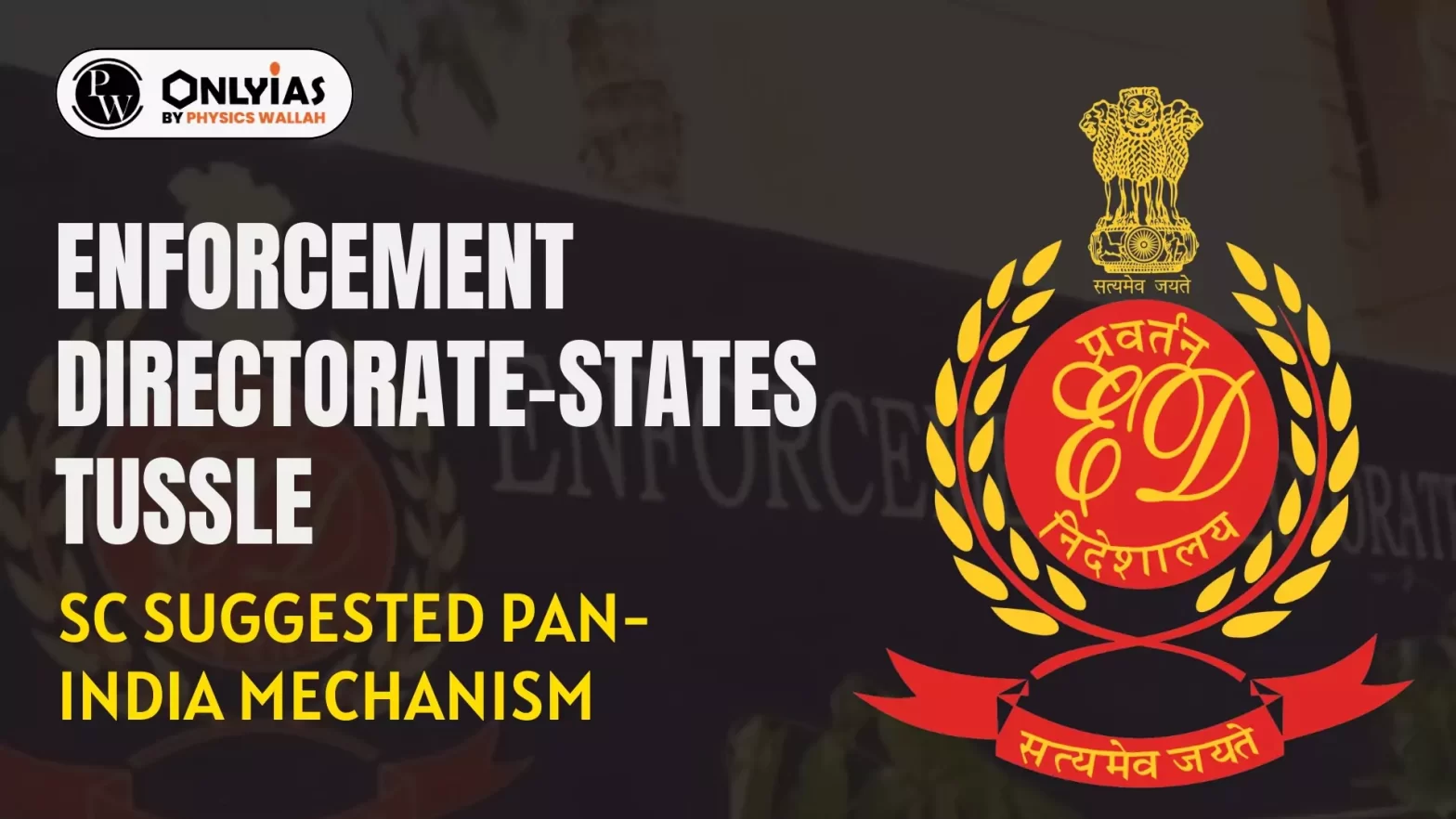Context:
This article is based on the news “Need a ‘mechanism’ to detect vendetta in ED-States cases: Supreme Court” which was published in the Hindu. The Supreme Court calls for a mechanism to detect political vendetta in the Enforcement Directorate (ED) probe.
SC Proposes Pan-India Mechanism for Enforcement Directorate-State Disputes
- Pan India Mechanism Enforcement Directorate-State Disputes: The Supreme Court has suggested a pan-india mechanism, incorporating “best practices,” to prevent political disputes between state governments and the Enforcement Directorate from hindering impartial criminal investigations into money laundering and corruption.
- Pilot Testing : It may be initially tested in Tamil Nadu before expansion in response to non adherence to shared details of investigations into corruption cases.
- Emphasized for Balanced Approach : The Bench expressed concern about potential conflicts between states and central agencies, emphasizing the need for a balanced approach to prevent vindictive actions.

About Enforcement Directorate (ED)
- Role: Enforcement Directorate was formed in 1956 for investigating economic offences under the Prevention of Money Laundering Act (PMLA), Fugitive Economic Offenders Act, Foreign Exchange Management Act and Foreign Exchange Regulation Act.
- Nodal Ministry : Ministry of Finance.
- Headquarters: NewDelhi
Powers of Enforcement Directorate:
- Issues Summons : It mandates the physical presence of individuals, who must submit necessary documents and respond to inquiries.
- Detention: It can detain records or property during investigations for up to 180 days with a valid reason.
- Enforcement Directorate enforces the following Acts:
-
- The Prevention of Money Laundering Act, 2002 (PMLA): It is a criminal law aimed at preventing money laundering & tasked with investigating, tracing assets, attaching property, and ensuring prosecution and asset confiscation.
- The Foreign Exchange Management Act, 1999 (FEMA): It is a civil law consolidating regulations related to external trade and payments in India.
- The Fugitive Economic Offenders Act, 2018 (FEOA): It discourages economic offenders from evading Indian law by allowing the ED to attach properties and facilitate asset confiscation for fugitive economic offenders.
- Under the Conservation of Foreign Exchange and Prevention of Smuggling Activities Act, 1974 (COFEPOSA), the Directorate is authorized to sponsor cases of preventive detention for contraventions of FEMA.
Associated Challenges With Enforcement Directorate (ED)
- Misuse of Power: It has faced criticism for its unrestricted authority to prosecute politicians and government officials without prior state government permission.
- The Prevention of Money Laundering Act (PMLA), initially focused on drug trafficking-related money laundering, has been expanded to cover minor offenses, drawing criticism
- Functional Opacity : Concerns about functional opacity and a lack of transparency arise from accusations of the ED targeting opposition parties in its case selection.
- Lower conviction rate: The agency has faced criticism for its low conviction rate, with no convictions between 2005 and 2013-14 and only 23 out of 888 cases registered between 2014-15 and 2021-22.
- Allegations of Political Meddling: The ED has faced accusations of political interference,Preferential treatment for individuals aligning with the ruling party, sparking concerns about bias and a lack of independence in the ED’s actions.
- Resource Constraints: The Enforcement Directorate operates within a restricted budget, limiting its capacity to thoroughly investigate and prosecute economic offenses.
- Interagency Cooperation Challenges: The ED encounters difficulties in securing cooperation from other law enforcement agencies, including the State Police and the Central Bureau of Investigation (CBI).
| On the Basis of |
Enforcement Directorate (ED) |
State Police |
| Jurisdiction |
The Enforcement Directorate operates as a specialized law enforcement agency under the Department of Revenue, Ministry of Finance, GoI. |
State police function under the administrative control of their respective state governments. |
| Function |
The primary mandate of the Enforcement Directorate is to enforce economic laws, focusing on cases related to money laundering and foreign exchange violations under the (PMLA) and the (FEMA)
|
State police are tasked with maintaining law and order, preventing and detecting crimes & ensuring public safety, as Police and Public Order fall under State subjects as per the Seventh Schedule to the Constitution of India. |
| Investigation |
The Enforcement Directorate examines cases related to economic crimes, financial scams, money laundering, and foreign exchange infractions, aiming to locate, identify, confiscate, and track down the proceeds of crime. |
State police investigate a wide range of crimes such as theft, robbery, assault, murder, kidnapping, drug trafficking, and other offenses outlined in the Indian Penal Code (IPC) and relevant state legislation. |
Registration of case |
They initiate investigations through search procedures & issue summonses, but they cannot independently register a case. Instead, they rely on agencies like the CBI or state police to register an offense, based on which the Enforcement Directorate files a Case Information Report. |
State police, on the other hand, are authorized to independently initiate investigations into cognizable cases without requiring court orders.
|
Admissibility of statement |
The provisions of the PMLA confer greater power to the Enforcement Directorate compared to the police. Under the PMLA, statements recorded before an investigating officer are admissible in court as evidence. |
Statements made by an accused to the police are generally inadmissible as evidence in a court of law. |
Way Forward
- Guarding Against Political Motives: The Enforcement Directorate, empowered by the Prevention of Money Laundering Act (PMLA), must avoid misuse of its extensive powers for political motives.
- Balancing Swiftness and Fairness: Investigations should not turn into punitive actions, and cases need swift resolution for timely trials and convictions.
- Emphasis on Systemic Reforms: The ED seeks a balance between expeditious proceedings and maintaining integrity, emphasizing the need for systemic reforms rather than extreme measures.
- Preserving Integrity:Navigating a delicate path, the Enforcement Directorate aims to preserve its integrity by accelerating investigations and court procedures.
Conclusion
The credibility of leading investigative institutions are under scrutiny. The fight against corruption is closely linked to overhauling investigative processes, requiring collaboration among adjudicating authorities for transparency and fairness. The Supreme Court’s intervention in the ED-states conflict, advocating for a screening mechanism to alleviate concerns of perceived or actual political vendettas, is a positive development.”
![]() 1 Feb 2024
1 Feb 2024


